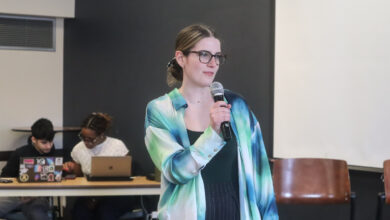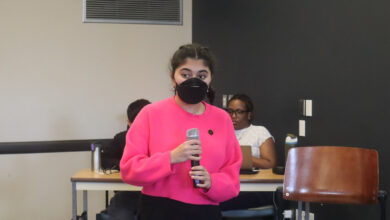The Legacy Fund has value for non-athletes but needs to better show it
If the Golden Bears and Pandas want to succeed, they need to get non-athletes on their side
 UofA Athletics
UofA AthleticsThis article expresses opinions based on the Candidate Forum of the Students’ Union 2021 Election on February 22, 2021.
Over the past year, many have questioned the value of their student fees. The COVID-19 pandemic has put many students in a tough financial position and, with many campus services now unavailable, even small dedicated fee units (DFUs) must show their worth.
For the Golden Bears and Pandas Legacy Fund, however, the problem is further compounded by the fact that non-athletics students don’t always see the value in paying this fee. If you’re not a student athlete or a kinesiology student, what do you realistically get out of this? For their referendum to pass, their campaign desperately needs to provide substantial answers to these questions and the ones given at the Candidates’ Forum on Monday February 22 weren’t enough.
To their credit, they did try to explain the value of the legacy fund to students. Samantha Chapman, their campaign representative at the forum, spoke clearly about what initiatives the fee funds and its importance. For example, she discussed how the legacy fund creates jobs for kinesiology students and pays for campus staples such as our mascot. Both of these are good points and demonstrate how the legacy fund contributes to making the University of Alberta a better place to learn.
When it came to fielding questions over how the fee benefits other students though, Chapman’s answers were far too broad. She mentioned that the DFU contributed to a more vibrant student culture through providing funding for on-campus events. Yet, she rarely provided any specific examples of events funded through the fee and, looking at the Athletics website, the main events-related initiatives they discuss is providing free food at events and paying for mascot costumes.
While GUBA and Patches are campus icons, I’m unconvinced this is reason enough for students who don’t attend sporting events or play for a campus team to vote yes on their referendum.
Additionally, Chapman’s explanation of what the fee went towards in COVID-19 was, frankly, disappointing. She attempted to highlight that the fee still employs some students but admitted much of the fee collected over the past year is being kept in trust.
Of course, this is an unfortunate reality and out of anyone’s control. Still, students voted against this fee last year and I imagine the Legacy Fund campaign didn’t win any extra supporters by talking about how students’ money is sitting in reserves.
Overall, this seems like a core problem the campaign needs to address. The reason why all students pay into the Legacy Fund, as I understand it, is because athletics brings students from across all faculties together as a community. It helps provide student athletes, from every department, unique opportunities and helps pay for quality campus experiences that are accessible to all. Sadly, I can’t say the campaign’s forum performance on February 22 emphasized these benefits enough.
If the campaign wants to win, they need better answers on these fronts. The best way they could do this is by providing students with more concrete examples in their remarks.
For example, instead of saying the Legacy Fund contributes to student culture, talk about the largest event that the DFU helped pay for. When someone asks how the fee benefits students outside of kinesiology, tell the story of how the fund helped an athlete from the faculty of arts travel to tournaments with their team, an experience they otherwise wouldn’t be able to afford.
Finally, instead of talking about the money sitting in trusts, inform voters what these reserve funds will go towards once COVID-19 lifts. The campaign could even release a comprehensive plan, breaking down where every dollar will go once we’re back in person.
By giving students these details, the campaign could illustrate how the Legacy Fund benefits our entire campus and makes us stronger. If they don’t, the campaign risks alienating the votes they need to win.
This article expresses opinions based on the Candidate Forum of the Students’ Union 2021 Election on February 22, 2021.




